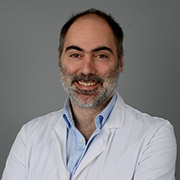Doctor Jean-Baptiste Micol
 Dr Jean-Baptiste Micol is a haematologist-oncologist and a member of the Haematology Committee at Gustave Roussy, specialising in chronic myeloid disorders (myelodysplastic syndromes) and acute myeloid leukaemia. He is also a physician-researcher within the INSERM UMR1287 research unit, focusing on "Haematopoietic Stem Cells and the Development of Myeloid Disorders."
Dr Jean-Baptiste Micol is a haematologist-oncologist and a member of the Haematology Committee at Gustave Roussy, specialising in chronic myeloid disorders (myelodysplastic syndromes) and acute myeloid leukaemia. He is also a physician-researcher within the INSERM UMR1287 research unit, focusing on "Haematopoietic Stem Cells and the Development of Myeloid Disorders."
Graduating in haematology from the University of Medicine of Lille 2 in 2008, Dr Micol initially served as a clinical assistant in the adult haematology department at Saint-Louis Hospital in Paris from 2008 to 2011. In 2011, he joined Gustave Roussy as a specialist physician in the Cancer Centres (CLCC). He headed the Clinical Haematology Department at Gustave Roussy from 2020 to 2022 and currently oversees the protected sector for acute leukaemia cases.
Holding a Master’s degree in "Molecular and Cellular Biology of Haematopoiesis" from the University of Paris Diderot, he obtained his PhD in oncology from the University of Paris-Saclay in 2016. His research was carried out at the Memorial Sloan Kettering Cancer Center in New York, where he worked under the supervision of Dr Abdel-Wahab from 2013 to 2016.
Dr Micol was awarded the translational research programme grant from the American and European Haematology Societies (ASH/EHA-TRTH program) in 2015 and received the SFH 2016 Prize from the French Society of Haematology. He is the author or co-author of over one hundred articles published in international journals.
His current research focuses on acute myeloid leukaemia, particularly those secondary to treatments for a primary cancer (such as PARP inhibitors or targeted internal radiotherapy), as well as pre-leukaemic conditions (clonal haematopoiesis or CHIP). In 2022, he launched the first national multidisciplinary molecular meeting dedicated to pre-leukaemic cases (RCP CHIP) and is developing clinical (INTERCEPTION) and biological (CLONAL INTERCEPTION) projects aimed at preventing acute myeloid leukaemia and myelodysplastic syndromes.
